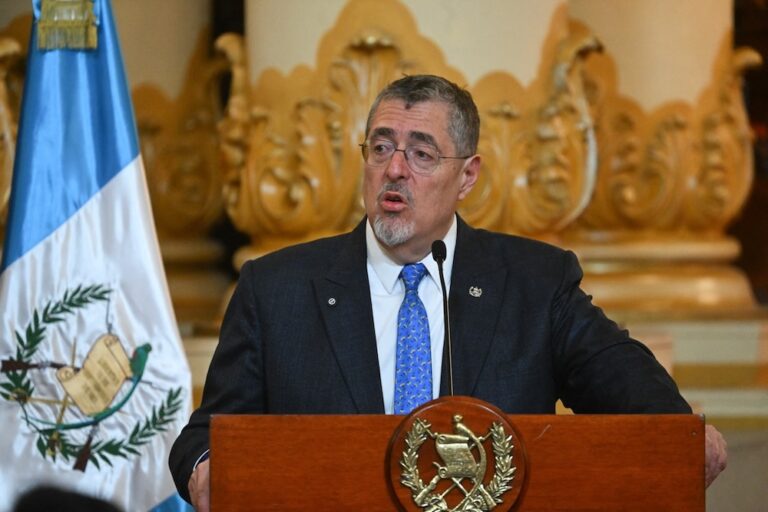(PFC/IFEX) – The following is a 10 January 2003 PFC release: On 19 September 2001, then presidential spokesperson Jorge Pérez announced that the government would begin legal action against those who disseminate “groundless news,” in reference to the news media. At the time, in a letter to President Alfonso Portillo, PFC condemned the statement and […]
(PFC/IFEX) – The following is a 10 January 2003 PFC release:
On 19 September 2001, then presidential spokesperson Jorge Pérez announced that the government would begin legal action against those who disseminate “groundless news,” in reference to the news media. At the time, in a letter to President Alfonso Portillo, PFC condemned the statement and reminded him that “press coverage is only a reflection of the high levels of corruption and the institutional resistance to investigate and punish those responsible.”
Throughout 2002, officials allegedly involved in corruption cases continued to verbally assault news organisations, particularly the print media. President Portillo and Vice-President Francisco Reyes were among the officials implicated.
To understand past and recent threats against the print media, it is important to be aware of the ties between President Portillo, the ruling Guatemalan Republican Front (Frente Republicano Guatemalteco, FRG), and Ángel González’s television monopoly. González was an important financial contributor to President Portillo’s election campaign. Moreover, his brother-in-law, Luis Rabbé, a former executive with González’s television companies, is the FRG’s current communications secretary and was a former minister of communications, infrastructure and housing.
When the media began reporting on Rabbé’s involvement in corruption cases that forced his departure from cabinet, he began attacking the press. For example:
– In February 2001, FRG sympathisers linked to Rabbé demonstrated in front of “elPeriodico” and threatened journalists working there.
– In October 2002, during the Inter American Press Association’s (IAPA) 58th General Assembly, held in Peru, Rabbé took out a paid advertisement in a Lima newspaper and wrote to IAPA representatives, accusing “elPeriodico”, “Siglo XXI” and “Prensa Libre” of being “the pawns of political groups” and of manipulating information. Rabbé cited some 1700 news items that were critical of him in a period of 18 months.
– On 20 December 2002, Rabbé accused the same publications of pressuring the US Embassy in Guatemala to revoke his entry visa to the United States.
But by far, the worst attacker of the media is President Portillo. Over the last three months, the following incidents have occurred:
– On 26 October 2002, he told dozens of supporters that “they (the media) will never report anything good, only the bad, because they are in a power struggle. We cannot be afraid.”
– The next day, during an interview with Radio Vaticano, the president said, “the Guatemalan print media is like an animal that chases its own tail and invents news items.
– On 29 October 2002, Portillo said, “I can say it with absolute freedom. No one can question the fact that ‘Prensa Libre’, ‘Siglo XXI’ and ‘elPeriodico’ are in a political struggle. They are working for a candidate. Why do they deny it? Why hide it?” He denied that government officials and the FRG supported Rabbé’s actions in Peru.
A public opinion poll conducted a few days later found that 97% of respondents did not believe that the press was involved in a power struggle through its denunciation of government corruption.
– On 8 January 2003, Portillo accused the local media of mounting a smear campaign against him after they reprinted information that appeared in the international press. “New York Metro”, “Red Streak”, published by the “Chicago Sun Times”, and Spain’s “La Vanguardia” had reported that Portillo purchased a US$30,000 watch. Portillo charged that “this is part of a political campaign orchestrated by ‘elPeriodico’, ‘Prensa Libre’ and ‘Siglo XXI’. We can be sure that this is the way some of the media behaves, when it blindly follows a political project. The same investors who bought stock in these newspapers have a political project and they are angry with a president who does not follow their orders.”
Government corruption in Guatemala is rampant and stifling, threatening the continuity of international development aid projects. Representatives from the European Union and the United States government have threatened to pull their funds from the country. Compounding the problem is the lack of political will to investigate the problem, the lack of independent government regulators, and a fumbling judicial system that fails to properly investigate and prosecute offenders.
In the absence of an official investigation into corruption, the investigations conducted by “elPeriodico”, “Prensa Libre” and “Siglo XXI” have been important in shedding light on corruption in Guatemala. The investigations have taken place despite verbal and physical attacks, serious restriction of access to public information and a recent attempt to force all working journalist to be part of a regulatory body.
For further information, see: http://portal-pfc.org/perseguidos/2002/107.html
Recommended Action
Send appeals to the president:
– calling on him to stop his attacks and those of his officials against the media, particularly those directed at “elPeriodico”, “Siglo XXI” and “Prensa Libre”
Appeals To
Alfonso Portillo
President of the Republic
Fax: +502 239 0090
Please copy appeals to the source if possible.


